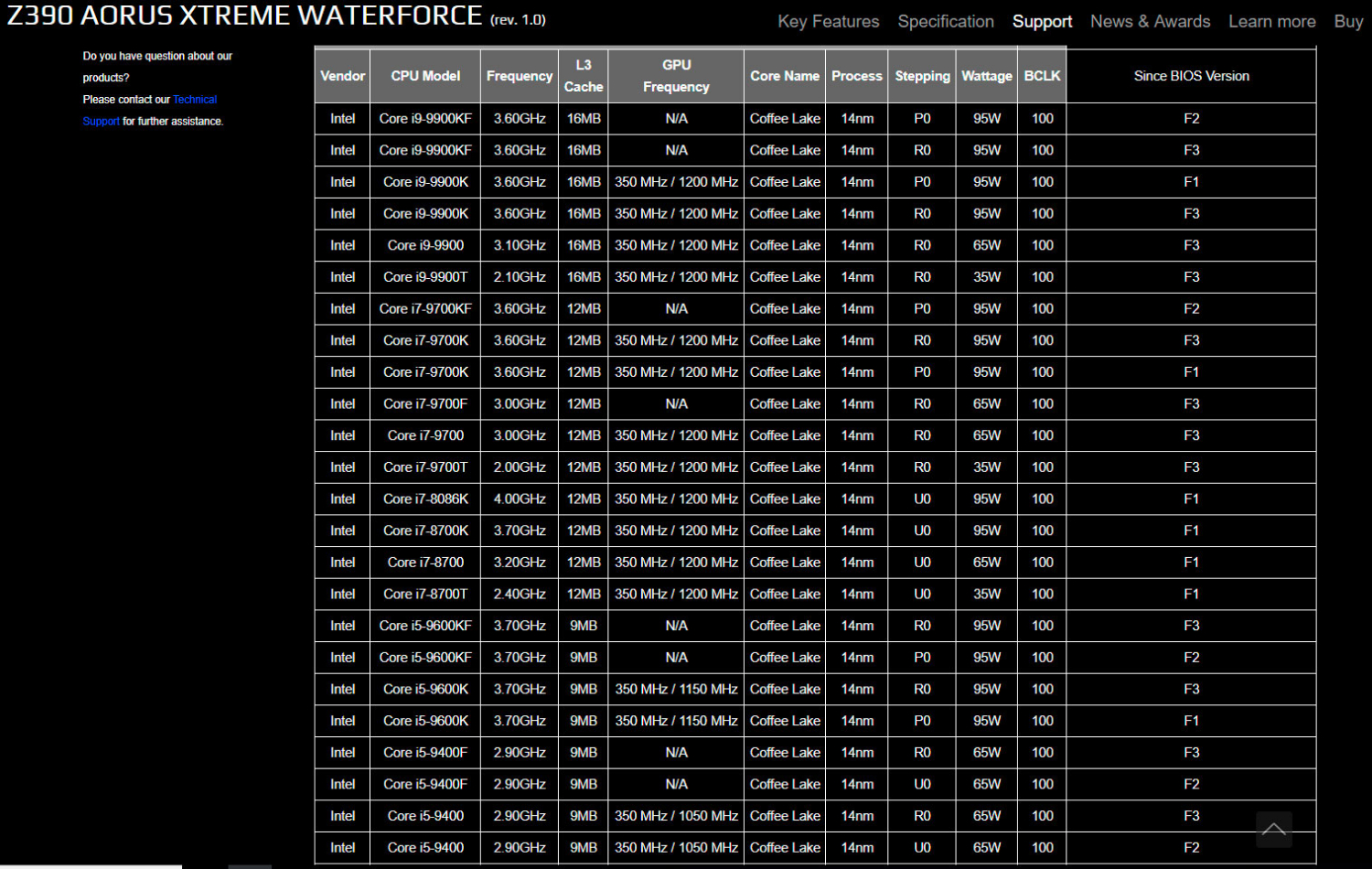Gigabyte Lists New 9th Gen Core CPUs With R0 Stepping
Word got out that motherboard manufacturers in the likes of ASRock, Asus, and Gigabyte have already started rolling out BIOS updates for Intel 300-series motherboards to house Intel's upcoming 9th-generation Core processors with the R0 stepping. However, Gigabyte has gone the extra mile and listed all the models that will receive Intel's stepping treatment.
First off, let's define the term "CPU stepping" since it's being thrown around a lot recently by the media. In layman's terms, a CPU stepping is essentially a revision to the original CPU design. Nothing in life is perfect, and CPU design isn't an exception. Therefore, a new stepping can bring different things to the table like bug fixes (which Intel refers to as "errata"), new features, or improvements to the manufacturing process (which typically results in more performance).
| CPU Model | Frequency | L3 Cache | GPU Frequency | Core Name | Process | Stepping | Wattage | BCLK |
| Core i9-9900KF | 3.60GHz | 16MB | N/A | Coffee Lake | 14nm | R0 | 95W | 100 |
| Core i9-9900K | 3.60GHz | 16MB | 350 MHz / 1200 MHz | Coffee Lake | 14nm | R0 | 95W | 100 |
| Core i9-9900 | 3.10GHz | 16MB | 350 MHz / 1200 MHz | Coffee Lake | 14nm | R0 | 65W | 100 |
| Core i9-9900T | 2.10GHz | 16MB | 350 MHz / 1200 MHz | Coffee Lake | 14nm | R0 | 35W | 100 |
| Core i7-9700K | 3.60GHz | 12MB | 350 MHz / 1200 MHz | Coffee Lake | 14nm | R0 | 95W | 100 |
| Core i7-9700F | 3.00GHz | 12MB | N/A | Coffee Lake | 14nm | R0 | 95W | 100 |
| Core i7-9700 | 3.00GHz | 12MB | 350 MHz / 1200 MHz | Coffee Lake | 14nm | R0 | 95W | 100 |
| Core i7-9700T | 2.00GHz | 12MB | 350 MHz / 1200 MHz | Coffee Lake | 14nm | R0 | 95W | 100 |
| Core i5-9600KF | 3.70GHz | 9MB | N/A | Coffee Lake | 14nm | R0 | 95W | 100 |
| Core i5-9600K | 3.70GHz | 9MB | 350 MHz / 1150 MHz | Coffee Lake | 14nm | R0 | 95W | 100 |
| Core i5-9400F | 2.90GHz | 9MB | N/A | Coffee Lake | 14nm | R0 | 65W | 100 |
| Core i5-9400 | 2.90GHz | 9MB | 350 MHz / 1050 MHz | Coffee Lake | 14nm | R0 | 65W | 100 |
| Core i5-9400T | 1.80GHz | 9MB | 350 MHz / 1050 MHz | Coffee Lake | 14nm | R0 | 35W | 100 |
The Core i9-9900K and Core i9-9900KF, which currently carry the P0 stepping ID, will transition to a new R0 stepping. Unannounced models, such as the Core i9-9900 and Core i9-9900T, will come with the R0 stepping. Surprisingly, there is no mention of the Core i9-9900F, which we recently uncovered from a SiSoftware Sandra leak.
It's a bit of a mess when it comes to the Core i7 family. While both the Core i7-9700K and Core i7-9700KF feature the P0 stepping, only the former will transition over to the R0 stepping. As for the unreleased models like the Core i7-9700F, Core i7-9700, and Core i7-9700T, they will all sport the R0 stepping.
As for the Core i5 parts, the Core i5-9600K and Core i5-9600KF will move over to the R0 stepping. The Core i5-9400 and Core i5-9400F with the U0 stepping will also follow suit. Lastly, the Core i5-9400T is expected to rock the R0 stepping right out of the box.
For the time being, it's uncertain what's the difference between the P0 and R0 steppings since Intel has a policy of not commenting on unreleased products. At first sight, the new processors with the R0 stepping don't seem to bear any noticeable changes. They still feature the same base clock speeds, the same amount of cache, and are produced under the 14nm process node.
Intel has the habit of releasing a "Specification Update" document entailing the errata fixes between steppings for processors that have gone through the process. For example, the chipmaker published one for its 8th-generation Core processors a few months ago. According to Asus, the R0 stepping processors will come out sometime in the second quarter of this year. Once Intel makes the document available, we'll know which errata have been fixed between the P0 and R0 steppings.
Get Tom's Hardware's best news and in-depth reviews, straight to your inbox.

Zhiye Liu is a news editor, memory reviewer, and SSD tester at Tom’s Hardware. Although he loves everything that’s hardware, he has a soft spot for CPUs, GPUs, and RAM.
